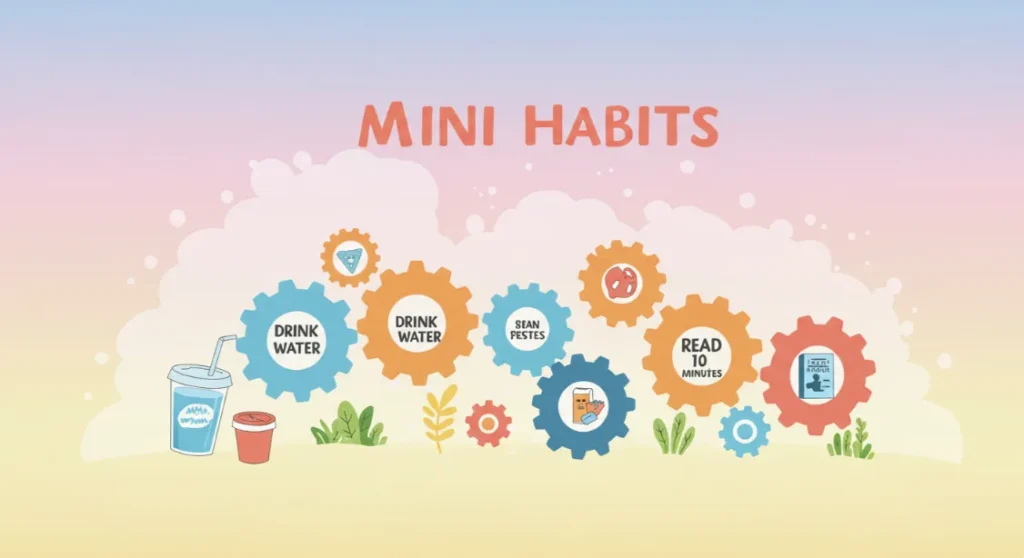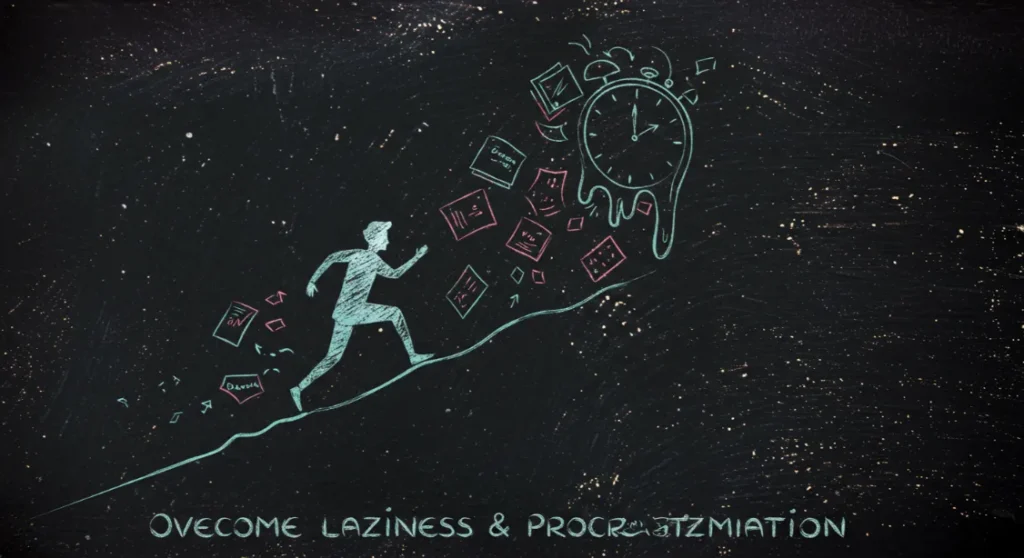Ever catch yourself scrolling through social media when you should be tackling that important project? You’re not alone. Did you know that a staggering 88% of the workforce admits to procrastinating at least one hour every day? That’s right—nearly 9 out of 10 people are putting off important tasks regularly!
But don’t worry; there’s hope for all of us procrastinators. In this guide, we’ll explore why we procrastinate and how to break free from its grip. Get ready to transform your productivity and achieve your goals!
Key Takeaways
- Procrastination is a common problem affecting 88% of workers daily.
- Understanding your personal procrastination triggers is crucial for overcoming them.
- Breaking tasks into smaller, manageable chunks can make them less daunting.
- Using the “2-minute rule” can help you get started on tasks quickly.
- Accountability partners or groups can provide motivation and support.
- Practicing self-compassion is essential for breaking the procrastination cycle.
Why Do We Procrastinate?
Let’s face it—procrastination is like that annoying friend who always shows up uninvited. But why do we keep letting it crash our productivity party? The truth is, procrastination isn’t just about being lazy. It’s often rooted in deeper psychological factors. Here are some common reasons we put things off:
- Fear of failure
- Perfectionism
- Lack of motivation
- Feeling overwhelmed
- Poor time management skills
Understanding these root causes is the first step in breaking free from procrastination. Once you know why you’re procrastinating, you can start developing strategies to overcome it.
Types of Procrastination
Not all procrastination is created equal. In fact, there are several different flavors of this productivity-killing habit. Let’s take a look at the most common types:
| Type | Description | Example |
|---|---|---|
| Perfectionist | Putting off tasks due to fear of imperfection | Endlessly revising a report |
| Dreamer | Planning but never taking action | Creating detailed to-do lists without starting tasks |
| Crisis-maker | Waiting until the last minute for an adrenaline rush | Cramming for exams the night before |
| Defier | Resisting external expectations or authority | Deliberately missing deadlines as a form of rebellion |
| Worrier | Avoiding tasks due to anxiety or fear of failure | Postponing a difficult conversation with a coworker |
Identifying which type of procrastinator you are can help you tailor your strategies for overcoming procrastination. Remember, self-awareness is key!
Identifying Your Procrastination Triggers
Now that we understand the types of procrastination, let’s get personal. What sets off your procrastination alarm? Is it the size of the task? The fear of failure? Or maybe it’s just plain old boredom? To identify your triggers, try keeping a “procrastination journal” for a week. Every time you catch yourself procrastinating, jot down:
- What task you’re avoiding
- How you’re feeling
- What you’re doing instead
After a week, look for patterns. You might be surprised by what you discover! Once you know your triggers, you can start developing strategies to overcome them.
Practical Strategies to Overcome Procrastination
Alright, enough talk about why we procrastinate. Let’s get down to business and explore some practical strategies to kick procrastination to the curb!
1. Break It Down
Remember that huge, scary task that’s been looming over you? It’s time to show it who’s boss! Break it down into smaller, manageable chunks. Suddenly, that mountain of work becomes a series of molehills. Much less intimidating, right? For example, instead of “Write a 10-page report,” try:
- Research topic (30 minutes)
- Create an outline (15 minutes).
- Write an introduction (20 minutes).
- Write the first section (30 minutes).
See? Much more doable!
2. Use the “2-Minute Rule.”

This simple trick can work wonders for getting started on tasks. If something takes less than two minutes to complete, do it right away. You’ll be amazed at how many small tasks you can knock out quickly, building momentum for bigger projects.
3. Create a productive environment.

Your surroundings can have a big impact on your productivity. Eliminate distractionsby turning off notifications, finding a quiet workspace, or using website blockers during work hours. Set yourself up for success!
4. Use time-blocking.
Assign specific time blocks for different tasks throughout your day. This technique, known as time-blocking, can help youstay focusedand avoid the temptation to procrastinate.
5. Practice the “Eat the Frog” technique.

Mark Twain once said, “If it’s your job to eat a frog, it’s best to do it first thing in the morning.” In other words, tackle your most challenging or dreaded task first. Everything else will feel easier afterward!
6. Reward Yourself
Don’t forget to celebrate your wins, no matter how small! Reward yourselffor completing tasks. It could be as simple as a coffee break or a few minutes of your favorite TV show. Positive reinforcement can help build good habits.
Developing a Proactive Mindset
Overcoming procrastination isn’t just about tactics; it’s also about changing your mindset. Here are some ways to develop a more proactive approach:
- Practice self-compassion: Be kind to yourself when you slip up. Beating yourself up only leads to more procrastination.
- Visualize success: Imagine how great you’ll feel when you complete your task. This can be a powerful motivator.
- Embrace imperfection: Remember, done is better than perfect. Don’t let perfectionism hold you back.
- Focus on growth: View challenges as opportunities to learn and improve, rather than obstacles to avoid.
- Cultivate mindfulness: Practice being present in the moment. This can help you stay focused on your tasks.
By shifting your mindset, you’ll find it easier to take action and stay motivated.
The Power of Accountability

Ever notice how much easier it is to stick to a gym routine when you have a workout buddy? The same principle applies to overcoming procrastination. Accountability can be a game-changer! Consider these options:
- Find an accountability partner.
- Join a productivity-focused group.
- Use apps that track your progress.
- Share your goals with friends or family.
Having someone (or something) to check in with regularly can provide that extra push you need to stay on track.
Overcoming Procrastination: A Day in the Life
Let’s put all these strategies into action with a hypothetical day in the life of a reformed procrastinator: 7:00 AM: Wake up andpractice mindfulnessfor 5 minutes.
7:30 AM: Eat breakfast while reviewing the day’s top priorities.
8:00 AM: Start work by tackling the most challenging task (“eating the frog”).
10:00 AM: Take a short break and reward yourself for progress.
10:15 AM: Use time-blocking for the next set of tasks.
12:00 PM: Lunch break and quick check-in with accountability partner
1:00 PM: Back to work, using the 2-minute rule for small tasks
3:00 PM: Another short break and progress review
3:15 PM Final work session, focusing on completing any unfinished tasks
5:00 PM: End of workday reflection and planning for tomorrow Remember, everyone’s ideal day will look different. The key is to find a routine that works for you and stick with it!
Conclusion: Your Journey to Productivity Starts Now
Congratulations! You’ve just taken the first step towards breaking free from procrastination.
Remember, change doesn’t happen overnight. Be patient with yourself and celebrate small victories along the way. As you implement these strategies, you’ll find yourself becoming more productive, less stressed, and more confident in your abilities. You’ve got this!
So, what are you waiting for? (See what I did there?) It’s time to take action and start living your most productive life. Your future self will thank you!
Resources
- The Now Habit: A Strategic Program for Overcoming Procrastination and Enjoying Guilt-Free Play by Neil Fiore
- Eat That Frog!: 21 Great Ways to Stop Procrastinating and Get More Done in Less Time by Brian Tracy
- Procrastination Research Group – Academic research on procrastination
- Focusmate a virtual coworking platform for accountability
- Forest App – Stay focused and plant real trees
- Todoist is a task management app with productivity features.